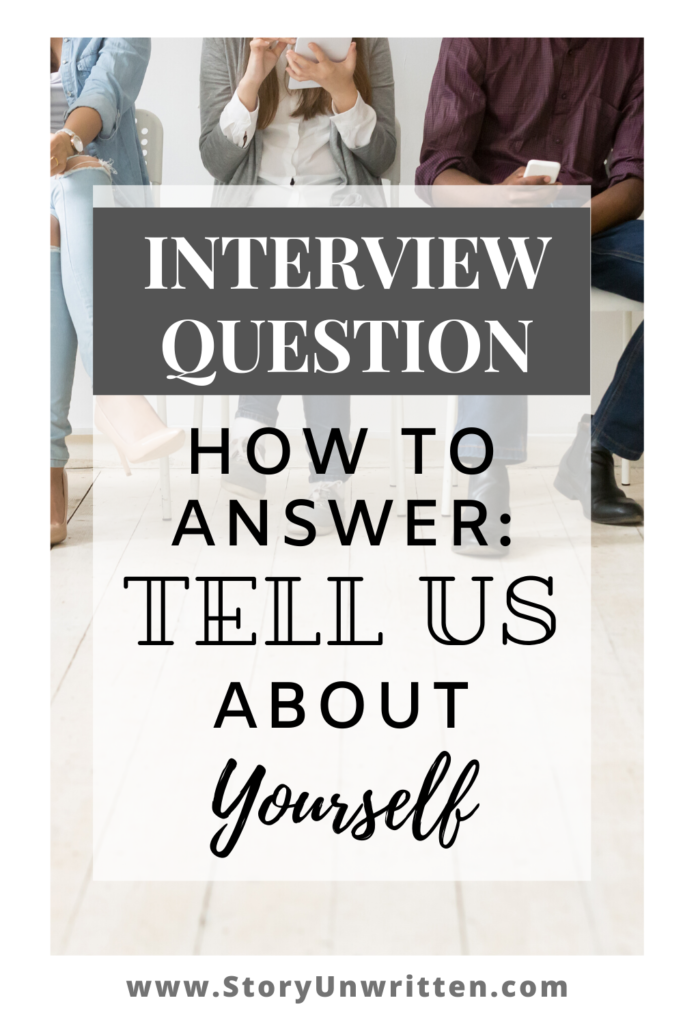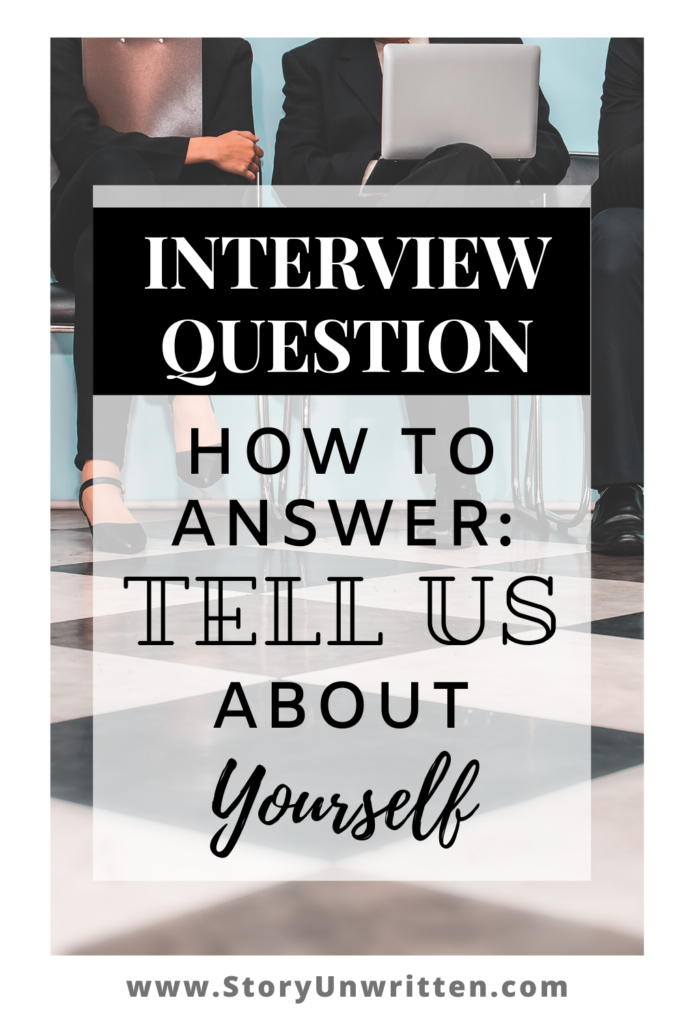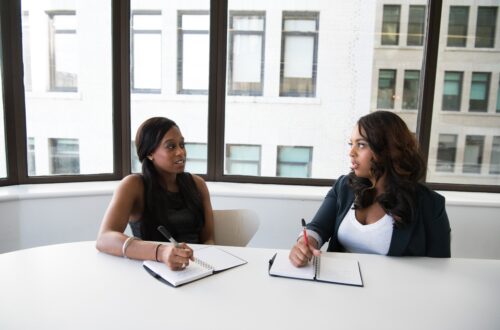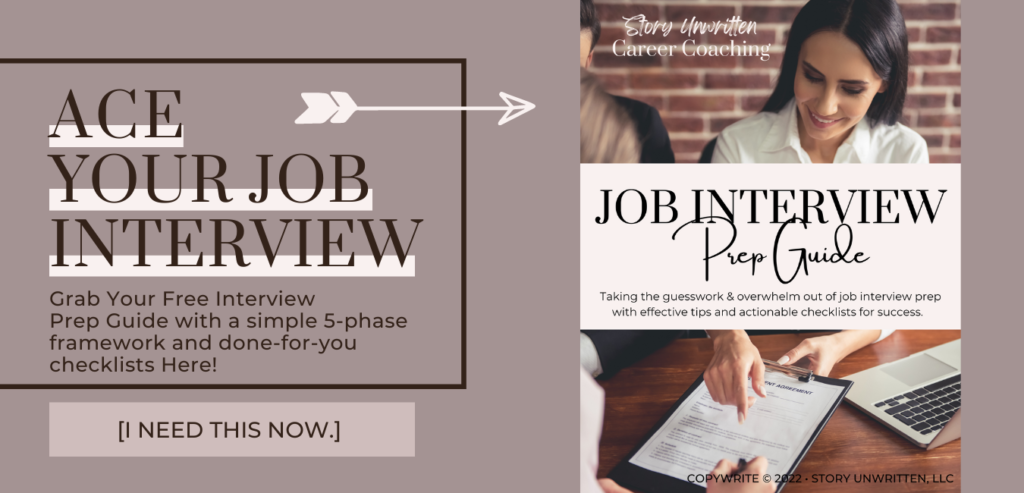
How to Answer the Interview Question: Tell us about yourself.
HELP! This interview question, “tell us about yourself,” is the broadest, and yet most predictable question asked at nearly EVERY interview you will ever have.
I am a professional recruiter and I have done HUNDREDS of interviews. I ask this question in every single interview I do, and I am here to give you the best tips on nailing your answer to this question!
This question comes in many different varieties (or disguises…surprise!), but it’s always getting to the same thing, and it usually is the first question you will need to answer.
Different Questions, Same Answer.
Here are some variations of the interview question you might see:
- Begin by telling us a little about yourself.
- Tell us about your experience, training, and education as it relates to this position.
- What makes you the best candidate for this job? (TRICK!)
- What have you done to prepare for this position? Or What have you done to prepare for the interview today?

You can see the questions can look very different. You MUST pay attention and respond to the subtle differences in each question, too.
But what are they all these interview questions concerning? Your past! What have you done to get yourself here in this chair, in this job interview, today? And what is it about your past that makes you “the one” for us, the employer?
Please, for the love, sell yourself. Be confident, not cocky. Be honest, clear, and succinct. Don’t undersell, don’t oversell. And stick to the point!
Your entire answer should never be more than 5 minutes in length. (Which is why you MUST practice this answer. I promise it will not be wasted time.)
There is a fine balance between “listing off your resume” and telling your story. At least 90% of what you say should be pointed directly at your RELATED experience for the job you’ve applied for.
RECRUITER TIP:
All of your related job experience does NOT need to be past work experience. This is your chance to tell the panel what they want to hear – that your past is a rich compilation of skills and experiences that make you the perfect candidate for THIS job, now. That can include on- and off-the-job experiences, if they are relevant. That’s critical.
How personal should I be?
10% of your answer can be a fun fact or two about yourself, but don’t get too personal. And please, don’t say, “Well I’m just a 26-year-old girl ready to grow my career.” Age is not a fun fact about you! (And it’s illegal for someone to ask you your exact age in an interview, so you’ll make the panel squirmy.)
Examples of fun personal facts to share might include:
- Something surprising about me is that I’m a marathon addict! I have run 6 marathons in the last 2 years. (Bonus tie-in: I’m very self-driven and I care about work-life balance and wellness for myself and my employees)
- A little fun fact about me is that I have visited every Major League Baseball Stadium in the country. And my favorite baseball team is the Colorado Rockies!
- In my free time, I love to hike with my dog Sam and take wildlife photography.
These are personal, fun, and interesting – but not too personal! Yet they still make you relatable. Human. You would be very surprised at the tiny little details that will stick to an interviewer’s mind and make them feel like they know you.
Here are 7 TOP TIPS to prepare and answer this question well:
TIP No. 1:
DON’T ASSUME THE INTERVIEWER KNOWS EVERYTHING ABOUT YOU BASED ON YOUR RESUME.
Even if you already told them in your application!
I see this mistake all the time, particularly with very experienced candidates. We say, “Please give us a brief overview of your related experience.” And the candidate says, “Well you’ve seen my resume, so you know I have 30 years of experience and I think I could bring a lot of talent to your team. I work with clients, I handle a lot of projects, and I’m excited about this opportunity.”
Does that answer sound nice? Yes. Does it answer the question? No.
Ok, so back to the question: “What related experience do you have?”
First of all, we didn’t memorize your resume when we looked at it with 50 others.
Second, you didn’t put every important detail in your resume, and we want to know!
Don’t hold back and answer the question, even if you think you’re repeating yourself a little.
TIP No. 2:
KNOW THE JOB DESCRIPTION WELL AND KEEP YOUR ANSWER RELEVANT TO IT.
Know the job description and the detailsof what the employer is looking for! Then, talk about your experience and education that fits directly into that job.
It sounds straightforward, but MANY people do not do this. It seems like they sit down for their interview and honestly have no idea what the job entails.
Some people spend half their time wondering all over the place and only once in a while hitting on information the hiring team really wants to hear.
YOU WANT TO BE IRRESISTIBLE: To be the person that has finally come to fill a void or solve their problems, or get them back in the swing of things.
If you read in the job description that the employer is looking for someone with skills in a specific software or function, please provide the details. Don’t just say, “I’ve worked with that software.” How? For how long? How well do you know it? Do you have a brief example of a project you did with it?
“I am a supervisor.” Of who or what positions? For how long? How many people? What kind of work do you direct? What challenges did you face?
Give a full and clear picture of your past experience.
If you have a job or two in your past that you really can’t find relevant experience in, please mention them, but don’t go into the minute details. It’s not related. In fact, sharing too much unrelated information in an interview typically accomplishes the opposite of what you want:
1) it makes the interviewer start to think, “maybe this person doesn’t have what we’re looking for,” or
2) it makes the interviewer say, “this candidate is so long-winded and does not know how to be succinct and organized.”
TIP No. 3:
STICK TO A REASONABLE TIMELINE IN YOUR RESPONSE.
If you’ve been a professional for 20 years, don’t go back to high school and your time as the captain of the football team. Don’t cut your professional time short either.
Summarize the most relevant period of time with the most relevant work experience and education for the job.
A mistake I see in this arena sounds like this: “I’ve been in customer service for over 30 years, and most recently I’ve worked as a manager for company A doing x, y, and z.” Great! What did you do for those other 30 years?! Don’t completely skip over your experience with an undetailed sweeping statement. You don’t need to give every detail of 30 years’ worth of experience, but don’t just mention it and move on either.
TIP No. 4:
DON’T SELL YOURSELF SHORT.
If you have very little professional experience, I’m talking to you! I see this all the time recruiting for entry-level positions.
Because a candidate has never worked in this professional area before, they doubt themselves and miss the point completely.
Don’t, don’t, DON’T start your answer off with, “well I don’t really have any experience in this job,” or “I’ve never done this kind of work before.” This is usually followed by “I’m a fast learner and a really hard worker.”
I just want to walk around the table and whisper in their ears, “Start over.” You have at least 20 years of LIFE experience that brought you to today, and some parts of that life qualify you to be here. That’s why we invited you to this party!
No, it’s not experience directly in this job. But you have had rich experiences and you have learned lessons and accomplished goals and overcome challenges in those experiences. Share them with us. Were you in team sports? Did you act as a leader? Did you take highly challenging academic classes? Did you start a club or volunteer every weekend? Did you earn an honor like Eagle Scout? SHARE! Those are the things that are making you a great employee before you are one.
TIP No. 5:
SPEAK IN PLAIN LANGUAGE.
If you are a highly technical professional dealing with technology or working in a niche profession, make sure that everyone on the interview panel is following along with you. Don’t rush on through technical terms, acronyms, and practices that are lost of half of the panel.
I’m not saying you shouldn’t say you’re an expert at these things, but make sure to slow down and explain what you’re talking about when necessary.
Everyone in the room may not be a subject matter expert, and you are selling to them just as much as the technical experts in the room.
Of course the only exception to this rule is if you are completely sure that everyone interviewing you is just as technically apt as you are.
TIP No. 6:
BRING PASSION AND ENERGY TO YOUR RESPONSE.
“Tell us about yourself” is the interview question that will make a very strong first impression. Be conversational, friendly, and energetic.
Let the passion for what you do shine through your answer as you reflect on your many life experiences. That passion is contagiousand the interview panel will feel it!
Being overly nervous, reserved, or relaxed can look like you’re uninterested or unengaged. I know it’s super nerve-wracking to interview, but try your very best to keep your head high, shoulders back, and eyes bright and engaged!
TIP No. 7:
PRACTICE TO KEEP YOUR ANSWER SUCCINCT AND RELEVANT.
Unless you are specifically instructed otherwise, keep your answer to 5 minutes or less. This should also be generally proportional to your related experience.
5 minutes doesn’t sound like a lot of time, but in an interview, it is.
In order to fit your answer into 5 minutes or less, and sound good doing it, PRACTICE!
This is the one answer that you should have ready to go because you can be 99% sure you will get to use it.
Write down the key points you want to share with the interviewer and practice making it flow with confidence and clarity.
Practicing will accomplish two things:
- It will ensure you don’t forget to cover everything that’s important for you to share.
- It will help calm your nerves. One of the most challenging parts of an interview is answering questions you are unprepared for. It is hard to be put on the spot in a time-pressured, public meeting. Having at least one answer ready to go means you won’t have to think too hard when this question comes your way.
Interviewing is hard and you are already on the right track preparing and researching on how to be successful!
I hope you enjoyed these tips and use them to launch into the chase for your dream job!
THIS WEBSITE CONTAINS AFFILIATE LINKS, WHICH MEANS THAT IF YOU CLICK ON A PRODUCT LINK, I MAY RECEIVE A COMMISSION. THIS WEBSITE IS A PARTICIPANT IN THE AMAZON SERVICES LLC ASSOCIATES PROGRAM, AN AFFILIATE ADVERTISING PROGRAM WHERE I EARN ADVERTISING FEES BY LINKING TO AMAZON.COM.



You May Also Like

5 Terrible Things NOT to Do In an Interview
August 17, 2023
How to Respond to Rejection After a Job Interview
July 7, 2021

3 Comments
Monalisha
Great points you have mentioned here…and point 2 is so important I feel. We should know about the description of the job before getting prepared for it. Thank you.
Caitlin
Thanks Monalisha – glad you enjoyed it!
ปั้มไลค์
Like!! Thank you for publishing this awesome article.